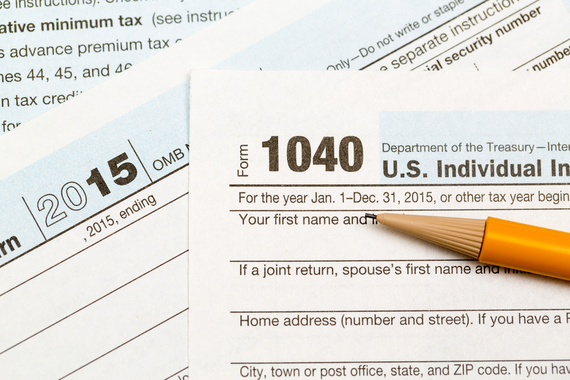A small business owner wears many hats--and one of them is usually an accountant's.
Deciding whether to do your taxes on your own or hire a professional is just one of the many decisions that you'll need to make each year ahead of tax time.
But either way, the time to start preparing for next year's taxes is right now. Many small business operators should be preparing year-round--or at the very least, before the start of the next calendar year.
With that in mind, we're offering our small business taxes prep list as a guide to everything you need to know before filing next year's return.
1. Familiarize Yourself With The Forms You'll Need
You can't file your taxes correctly without the right form, so identifying the proper tax documents you'll need is one of the first steps that any small business owner should take.
The type of form you require will depend on the nature of the enterprise you run.
- If you're a sole proprietor, attach a Schedule C Form to your personal income tax return, or use a 1099-MISC
- If you're a corporation, use a 1120 Form
- If you have S Corporation status, use an 1120S
- If you're a partnership, report expenses, income and losses on a Form 1065
2. Gather All The Financial Documents You'll Need to Complete Your Return
The amount of information you'll need to file can be pretty extensive.
Here's a list of some of the most common documents that small business owners should track down before filing:
- Bank statements
- Statements for business credit cards and personal credit cards
- Payroll documents
- Last year's business tax return
- Partnership agreements
- Accounting documents
- Asset purchase details
- Depreciation schedules
- By making sure all this information is on-hand before beginning, business owners can make the tax preparation process less time-consuming.
3. Make A List of Income and Expenses
If you run a small business, be prepared to make a thorough accounting of all income and expenses associated with the company.
Items that fall under the income category include:
- Gross receipts
- Checking and saving account interest (Form 1099-INT)
- Sales records
- Returns and allowances
- Other unclassified income
Typical expenses that must be accounted for include:
- Employee wages
- Office rent or portion of the rent or mortgage of your home
- Insurance premiums
- Fees paid to professionals such as your accountant
- Payment to contractors (Form 1099-MISC or 1096)
- Transportation and travel
- Advertising
- Phones and communication devices
- Computers and internet fees
- Office supplies and equipment
- Having a detailed accounting of all income and expenses is critically important to preparing an accurate return.
4. Examine Your Deductions With a Fine-tooth Comb
Deductions are similar, but not identical, to expenses.
Whether you operate your business as a sole proprietorship, partnership, or corporation, you're allowed to deduct "ordinary and necessary" expenses required to running your business. If you can prove that an expense is relevant, you can deduct it from your taxable income--lowering your income, which lowers the tax that you owe.
Small business owners are entitled to a variety of deductions: furniture, supplies, software, employee reimbursement, and some startup costs are just a few of the dozens of possible deductions a business owner can take.
Insurance is another key deduction for most businesses.
Premiums you pay related to malpractice, worker's compensation, and liability are generally deductible.
You also might be able to deduct medical and dental premiums for you and your dependents if you operate a sole proprietorship or partnership. Plus, tax credits are available for some small business owners who pay a certain percentage of employee healthcare costs.
If you research them thoroughly and employ them correctly, these deductions can save you a substantial amount of money by lowering your tax bill--money that can then be invested back into your business to help it grow.
But if you interpret the tax code wrong and take deductions that you shouldn't, you're inviting an audit--and potential financial penalties down the road.
5. Get Your Financial House in Order
Nothing will slow you down faster than sloppy record keeping.
Make sure all your records are current and accurate, and keep everything you might conceivably need.
A good rule of thumb is this: if you have data and you're uncertain whether you should keep it... Keep it. Only discard documents and information you're positive has no further use.
Generally speaking, the IRS suggests keeping tax-related documents for three years after filing, although the timeframe varies for different criteria.
Additionally, it's a good idea to learn about the latest and greatest in technology. Cloud-based tax software and accounting systems can help you keep a close eye on your data and help you make sure that you get everything you're entitled to.
6. Explore Your Options If You Need Additional Time
If April 15th is bearing down and you feel like you're not going to make it, there's some good news: the IRS allows businesses to ask for a filing extension. Use Form 7004 to request an extension to file your business income tax.
There are some other factors to consider, however.
While your extension request might buy you extra time to file, it won't push back your deadline for making a payment. If you fail to pay by April 15, you'll expose your business to the possibility of extra financial penalties and accrued interest.
***
Very few people look forward to tax season--and that often goes double for the people responsible for both business and personal taxes.
We usually focus on small business loans and small business funding, but we wanted to create this guide to put you in the best position to negotiate next year's taxes with ease.
This article was originally published on the Fundera Ledger on June 16, 2016.

